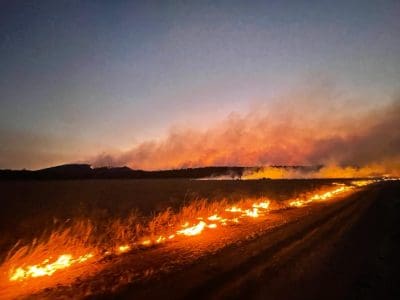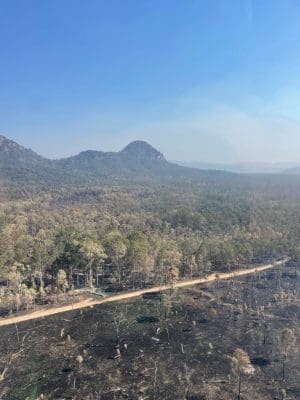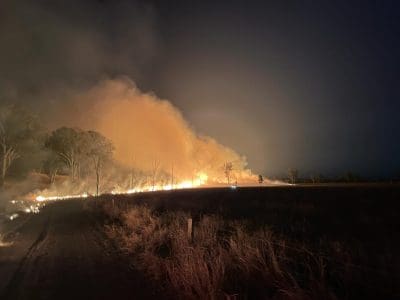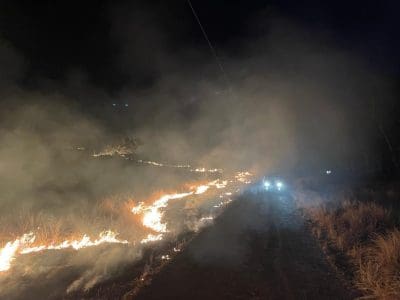Flying through smoke in his own helicopter above fire lines, Central Queensland cattle producer James Speed has been alerting local landholders and rural fire brigade volunteers on the ground below to movements in fire fronts and locations of fire break jumps as they occur in real time.
 When Beef Central called him to discuss the recent massive CQ fire, he said he could think of a thousand other things he’d prefer to be doing, but felt it was important to speak out to ensure the experiences of the past month are not forgotten and mistakes not repeated.
When Beef Central called him to discuss the recent massive CQ fire, he said he could think of a thousand other things he’d prefer to be doing, but felt it was important to speak out to ensure the experiences of the past month are not forgotten and mistakes not repeated.
He also stresses that his concerns are not directed at any individuals specifically, and by and large he believes everyone involved in the fire-fighting effort has had good intentions at heart.
But problems occur when control of rural fires is transferred to command centres from the “big smoke” without adequate coordination with people with local knowledge and expertise, and a system that prevents adequate preparation before bushfires, resulting in blazes that become far more destructive forces across the entire landscape.
Mr Speed said previous requests in winter months for cool burns in nearby national parks to reduce fuel loads had been met with the response that showers of rain were needed first, so the ground would be wet before the fire was put over it to ensure grass would shoot straight away and not leave the ground bare for too long.
“Well, this is Central Queensland, we don’t get a shower of rain until October,” he said.
“The next day it is 40-degree heat, any moisture within the ground is gone, and by the time they get their fire sorted, it is back into drought conditions again.
“It will just roar and the ground will be left bare anyway.
“They think they’re environmentalists but they have no idea what they are doing.”
 Without controlled cool season burns in national parks the system was “destroying what it is supposed to be protecting”, he said.
Without controlled cool season burns in national parks the system was “destroying what it is supposed to be protecting”, he said.
As an example he pointed to the disappearance of koalas in nearby national parks.
Almost 30 years ago, he said, his family sold some nearby country which became a national park.
“There were koalas in that country then then, but I doubt you’d find one today.
“I reckon they have been burned out.
“Some of that country from what I know hasn’t been (control) burned for the last 20 years.
“So what was going to happen?
“Of course it was going to bloody roar wasn’t it.”
Without hazard reduction burns as had happened in the past, fires burned far hotter and more intensely when they do occur, effectively “burning national parks to death”.
 Mr Speed believes much of the substantial sum of money being spent trying to control fires would be better spent on preparation such as winter fires and investing in maintaining fire breaks for fire and erosion control.
Mr Speed believes much of the substantial sum of money being spent trying to control fires would be better spent on preparation such as winter fires and investing in maintaining fire breaks for fire and erosion control.
“These fires shouldn’t have happened, some of it should have been burned in winter time when they could be controlled, and we wouldn’t be having this conversation today.”
A lack of coordination between fire command centres away from the frontline and landholders and volunteers on the ground was another issue, he said.
Landholders lighting back burning fires to halt the larger fire front were being threatened with prosecution, with the warning they are technically in breach of rules prohibiting people from starting fires under a total fire ban.
A “fear of litigation” was discouraging people at all levels from making decisive calls at critical times he said.
 “If you make a decision and it goes wrong you’re responsible.
“If you make a decision and it goes wrong you’re responsible.
“If you don’t make a decision then no one is responsible, are they.
“People high up in the food chain are not game to make a decision.
“And if you (as a landholder) make the decision to backburn and that fire jumps, you’re then responsible.
“It is all about responsibility, no one is game to put their hand up and take responsibility because if it turns pear shaped then they sue that individual to the point that they’re broke.
“The person who makes these decisions has got to be protected from the litigation should it go wrong.
“The indemnity side of it is what beats people. ”
 Mr Speed said when fires become as intense as they have in the region in the past month, the scars last for years to come.
Mr Speed said when fires become as intense as they have in the region in the past month, the scars last for years to come.
10 years ago his property was burned out, and the landscape had still not fully recovered, he said.
“I know the carrying capacity on my place isn’t what it was prior to the fire 10 years ago,” he said.
“The damage that has been done to the pasture will be long term in any of that fire area.
“The ground gets hot, you don’t get the same density of grass, it gets hard.
“It is like burning your vege garden, no one burns their vege garden, they want the mulch on the ground, so it burned all that off.
“I can show you on Goodliff places that were burned 10 years ago, and you can see where the fire break was, and the grass that was protected that didn’t get burned, you can see the difference from the air, it is chalk and cheese.
“And if you want to go and talk about emissions to the atmosphere – they’re banging on about all that sort of stuff, they want us to be carbon neutral , yet we have these fires… the parks would never be carbon neutral would they.”
